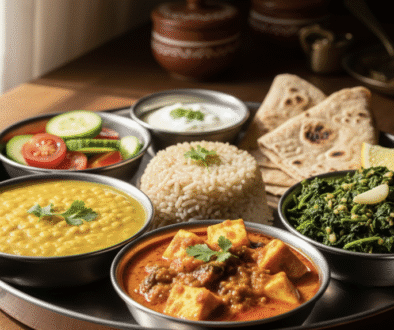Muscle Gain on a Vegetarian Diet: Foods to Eat & Avoid
When people talk about muscle gain, the first thing they think about is chicken breasts, eggs, and fish. But what if you are a vegetarian? Does that mean building muscle is impossible for you? Absolutely not. I’ve met so many vegetarians who believe that without meat, they can’t gain muscle. This is one of the biggest myths out there. The truth is, with the right vegetarian protein sources and smart meal choices, you can build strong muscles, all without touching a single piece of meat.
In this blog, I’ll walk you through what to eat and what to avoid if you want to gain muscle on a vegetarian diet. And trust me, the options are far tastier than you might think.
What to Eat for Muscle Gain
- Lentils and Legumes
Every vegetarian home has dal bubbling away on the stove. But did you know this everyday food is also one of the best protein sources for vegetarians? Lentils, black beans, and chickpeas are all rich in protein and fiber. You can cook them in curries, toss them into salads, or even blend them into soups.
- Paneer and Dairy Products
Paneer is the king of vegetarian protein. It’s soft, creamy, and fits into almost every Indian dish. Other dairy products like Greek yogurt, milk, and cheese are also great for muscle gain. They give you both protein and calcium, a powerful combo for strong bones and healthy muscles.
- Quinoa and Brown Rice
For muscle gain, you need more than just protein. You need carbs for energy too. Quinoa is a fantastic grain because it offers both protein and fiber, plus essential minerals. Brown rice is another smart choice. It’s healthier than white rice and keeps you full longer; perfect for fueling your workouts.
- Soy Products (Tofu, Tempeh, Soy Chunks)
Soy products are a gift to vegetarian fitness lovers. Tofu and tempeh are both packed with protein and can be used in curries, stir-fries, or salads. Soy chunks are another high-protein option. They’re easy to cook, soak up flavors well, and fit into a variety of dishes.
- Nuts and Seeds
Nuts and seeds are small in size but mighty when it comes to muscle gain. Almonds, walnuts, chia seeds, flaxseeds; they all offer protein, healthy fats, and fiber. You can eat them raw, sprinkle them over salads and smoothies, or mix them into your oatmeal for an extra protein punch.
- Vegetables with Protein
While vegetables are mostly known for their vitamins and minerals, some veggies also offer a surprising amount of protein. Spinach, peas, broccoli, and Brussels sprouts are great examples. Add these veggies to your daily meals for a natural boost of nutrients and protein.
- Protein Powders (If Needed)
If you struggle to get enough protein from food alone, you can consider plant-based protein powders. Options made from peas, rice, or soy are widely available. A quick shake after your workout can help your muscles recover faster and grow stronger.
Foods to Avoid for Muscle Gain
Now that we know what to eat, let’s talk about what to avoid. Not all vegetarian foods are helpful for muscle gain. Some can actually slow you down.
- Sugary Snacks and Desserts
I know sweets are hard to resist, but they’re no friend to your muscles. Gulab jamun, chocolates, and candy offer lots of sugar and zero protein. They fill you up with empty calories, which leads to fat gain instead of muscle.
- Processed Junk Food
Chips, instant noodles, and packaged snacks might taste good, but they’re low in nutrients and protein. They don’t give your muscles the fuel they need to recover after exercise.
- Soft Drinks and Sugary Beverages
Sugary drinks like sodas and energy drinks mess up your insulin levels and lead to fat storage. Stick to water, coconut water, or fresh lemonade.
- Low-Protein Meals
Some vegetarian meals are all carbs and have no protein, like plain rice with aloo sabzi. While these meals taste comforting, they won’t support muscle growth.
- Fried Foods
Samosas, pakoras, and fries are delicious, but deep-fried foods slow down digestion and add unhealthy fats to your diet. These fats don’t help your muscles at all. Choose grilled, roasted, or steamed options instead.
Final Words
Gaining muscle on a vegetarian diet is not just possible; it’s practical and delicious if you choose wisely. There’s no shortage of high-protein vegetarian foods waiting for you in your own kitchen. With the right mix of vegetarian protein sources, good carbs, and healthy fats, you can build muscle without needing meat. And next time someone says; Vegetarians can’t build muscle, you’ll know exactly what to say and what to eat.
So, are you ready to fuel your muscle gain journey the vegetarian way?



